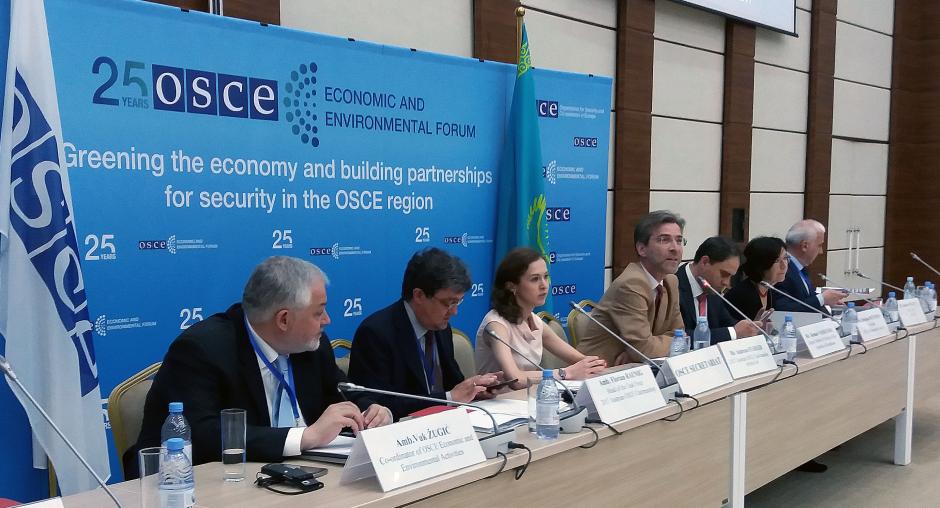Greening the economy and building partnerships for security in OSCE region of critical importance, say participants at OSCE discussion in Astana

ASTANA, 15 June 2017 – Greening the economy and building partnerships for security in the OSCE region – transitioning to a greener, cleaner and smarter economy - is the focus of the two-day Second Preparatory Meeting of the Annual OSCE Economic and Environmental Forum, which opened today in Astana.
Officials and representatives from the OSCE’s 57 participating States, including stakeholders from non-governmental organizations, academia and international organizations are demonstrating a high-level commitment to take the lead in the green transition.
Roman Vassilenko, Deputy Foreign Affairs Minister of Kazakhstan, noted the importance of the OSCE’s role in assisting participating States in developing the vast potential of its economic and environmental activities. Vassilenko said that the infrastructure built for Astana EXPO 2017 will become the site for the International Centre for Green Technologies and Investments and a new research complex of Nazarbayev University. “One of the main objectives of this endeavour is to exchange best practices and latest advancements in research, and facilitate the transfer of environmentally-conscious technologies into economically-viable projects.”
“The OSCE’s actions in the environmental field can make a difference,” said Ambassador Florian Raunig, Head of 2017 OSCE Austrian Chairmanship Task Force. “Common challenges linked to the use of natural resources can bring people to work together towards a common goal. We are convinced that environmental co-operation can be a powerful tool for preventing conflicts and building confidence between communities and societies.”
The Co-ordinator of OSCE Economic and Environmental Activities, Vuk Žugić, stressed that the Green Bridge of Kazakhstan, a partnership programme for a stable and long-term green investment, confirms the commitment to the green economy, contributing to sustainability and security in the whole OSCE region. “Only mutual co-operation and a commitment to the concept of comprehensive, equal and indivisible security, which must be further developed, can bring success.”
During the next two days participants will focus on enhancing resource efficiency and greening the economy, identifying the benefits and good practices from the region.
Christine Muttonen, President of the OSCE Parliamentary Assembly (PA), said: "The OSCE PA will continue to urge OSCE countries to move towards a greener economy. But this is not where our commitment ends. Parliamentarians can do more. We have a unique role to play in promoting the transition to a green economy - within the OSCE, in our governments back home, among our industries and among our citizens."
Renewable energy and its contribution to energy security and green growth will also be discussed. The role of renewable energy in the energy security equation is growing, driven by the 2030 Agenda for Sustainable Development and the need to reduce carbon emissions.
Daniele Violetti, Chief of Staff of the United Nations Framework Convention for Climate Change (UNFCCC) outlined what the Paris Agreement offers in terms of transformation towards a green economy, how climate action fits into the push for sustainable development and the unprecedented momentum in the real world towards a new model of growth and development. “I encourage all OSCE members to embrace the promise outlined in the Paris Agreement. And I ask you to raise ambition now, as time is running out. In this new era of implementation, development policies must be explicitly linked to the stability that increases security in our interconnected world.”
Participants will also deliberate on the importance of reducing environmental risks and strengthening good environmental governance. Environmental risk can result from environmental degradation, pollution or mismanagement of waste. Good governance of environmental issues needs responsive governments and inclusive decision-making.
The findings from the meeting will complement conclusions from the Forum’s First Preparatory Meeting in January and pave the way to the Concluding Meeting in Prague from 6 to 8 September 2017, as well as contribute to the formulation of possible deliverables at the OSCE Ministerial Council, which will take place on 7 and 8 December in Vienna.
